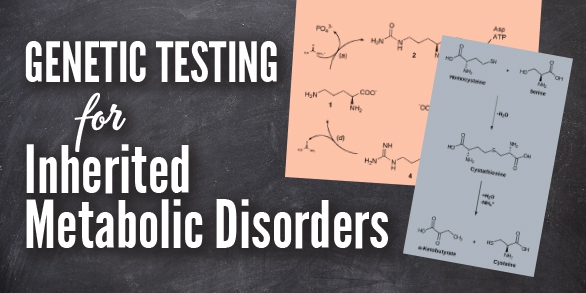Genetic Testing for Inherited Metabolic Disorders
Published on

PreventionGenetics offers a wide variety of genetic testing for inherited metabolic disorders, also known as inborn errors of metabolism. Panels specific to one disorder are available, as well as comprehensive metabolic panels that cover broader phenotypic features or groups of similar disorders, including, for example, tests for hyperammonemia (37 genes); metabolic hypoglycemia (38 genes); and metabolic myopathies, rhabdomyolysis, and exercise intolerance (83 genes). Over the past year, we’ve begun offering several new tests related to these disorders, and many of our existing panels have been updated to include more genes and increase clinical sensitivity.
Inborn Errors of Metabolism
Inborn errors of metabolism (IEMs) are a large, heterogeneous group of genetic disorders caused by single gene defects that disrupt normal metabolism. These defects typically occur in enzymes, leading to toxic accumulation of compounds, such as amino acids or carbohydrates, or their metabolites. They may also cause deficiencies of the products usually resulting from the metabolism of these substances (Rice and Steiner, 2016; Vernon et al. 2013). The majority of genetic metabolic conditions are inherited in an autosomal recessive manner, but some are inherited in an X-linked or autosomal dominant fashion.
Although individually rare, IEMs as a whole are fairly common, with an incidence of around 1 in 800 (Sanderson et al. 2006). Many IEMs are identified through routine newborn screening, as they can lead to serious health problems, or even death, without early detection and treatment. The most common treatment type for IEMs is dietary modification, but other treatment types, such as cofactor supplementation, enzyme replacement therapy, or organ transplantation are available for certain conditions (Vernon et al. 2013).
Diagnosis
Diagnosis of an IEM involves careful examination of clinical features and biochemical and molecular testing. Biochemical testing is used to detect abnormal levels of compounds, while molecular testing identifies the specific gene variants involved in a patient’s disorder. Genetic testing can be especially important for disorders difficult to detect with biochemical testing methods or when treatment availability or type is dependent on the specific gene affected. Early detection and treatment of IEMs is of the utmost importance, many IEMs can lead to severe or fatal effects if left untreated.
Testing at PreventionGenetics
We have many options for genetic testing related to IEMs at PreventionGenetics, designed to fit the needs of our providers and patients. For example, we offer a 39 gene sequencing panel for disorders related to metabolism of cobalamin, folate, and homocysteine, but more targeted approaches, including disease-specific panels or single gene tests such as those for phenylketonuria (PKU), are also available. Our genetic testing panels for metabolic disorders now include copy number variation (CNV) detection using NextGen sequencing data. Our wide variety of testing options allows the best testing strategy to be chosen based on clinical urgency and the patient’s clinical and biochemical phenotype.
For a list of tests for metabolic disorders and diseases, see our Metabolic and Newborn Screening Follow-up test menus.
References:
Rice GM, Steiner RD. Inborn Errors of Metabolism (Metabolic Disorders). Pediatr Rev. 2016 Jan;37(1):3-15. PubMedID: 26729777.
Sanderson et al. 2006. Archives of Disease in Childhood. 91(11):896-9. PubMed ID: 16690699.
Vernon et al. 2015. JAMA Pediatrics. 169(8):778-82. PubMed ID: 26075348.



